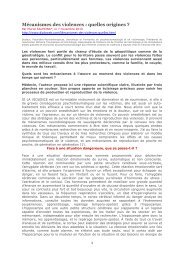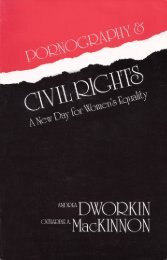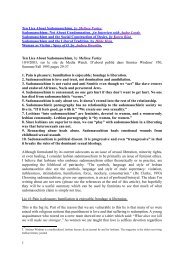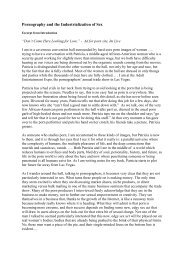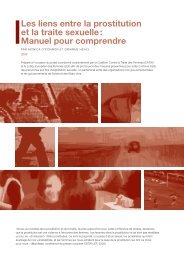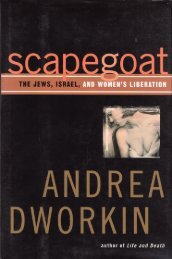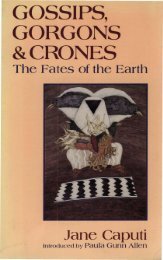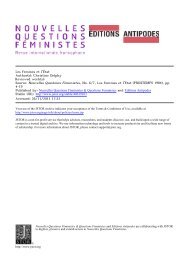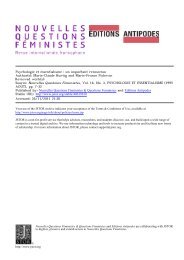4 NOTHING MAT(T)ERSWe cannot afford to continue to separate the intellectual in a man (I choosemy terms carefully) from the emotional: the depression from the ideas; or thepolitical from the p<strong>ers</strong>onal: the commitment to class struggle from the stormymarriage, the dead wife… Neither Althusser, “France”, nor the world’sintellectuals and revolutionaries will acknowledge patriarchy as the powerful,pervasive and pernicious ideological state apparatus which it is; at the sametime, none <strong>of</strong> them escape its effects (Finn: 1981, p. 28, italics in original).When Althusser died in 1990, many masculine Marxists and philosoph<strong>ers</strong> still foundreference to the murder to be in very bad taste. One obituary read:It is still too early to draw up a balance sheet. The master has left too deep animpression on us. Above all, the man was so close to us, with his exquisitegentleness, his tact…Then came the tragedy, which he himself described, partly out <strong>of</strong> a sense <strong>of</strong>propriety and partly out <strong>of</strong> derision, as the “non-event”, the killing <strong>of</strong> his wife,the committal to hospital (Comte-Sponville: 1990, p. 16). 3Gregory Elliott is more indignant and feels that Althusser is unjustly attacked andbeset: “doubtless pour décourager les autres, some have not hesitated to identify thedeath <strong>of</strong> Hélène Althusser at her husband’s hands as the inevitable denouement <strong>of</strong>[his theoretical endeavour]” (1991, p. 28). Indeed, Hélène victimizes Louis Althusserby staging a supposed murder, murder rendered now in quotation:When, in November 1980, defeat came, provoked in part by the politicalsetbacks <strong>of</strong> the late ’70s, the pitiless form it took—the “murder” <strong>of</strong> hiscompanion <strong>of</strong> some thirty-five years— condemned him to oblivion thereafter(1991, p. 29).Melancholic musings on the Master beset by feminism and the woman hemurdered… A Master is Being Beaten.No manifesto has been endorsed by structuralism, the nouveau roman, semiotics,deconstruction, poststructuralism and postmodernism. The Saussurian-dominatedintellectual problematic was inaugurated by Lévi-Strauss in reaction to the Marxismand existentialism <strong>of</strong> Sartre and oth<strong>ers</strong>. Yet the indefinability and shiftingcategorization <strong>of</strong> Lacan, Derrida and Foucault contribute to the confusionsurrounding already abstract, slippery texts. It’s difficult to know who is what,where, and when. This is also complicated by their search for ancestors. 4 JohnRajchman (1991, p. 120) remarks that “postmodernism is what the French learnedAmericans were calling what they were thinking.” What follows is a briefpresentation <strong>of</strong> definitions and a history <strong>of</strong> the categories.3. I am grateful to Angela Miles who brought this reference to my attention.4. Nietzsche, for example, is und<strong>ers</strong>tood in conjunction with postmodern anti-narrative critique(Shapiro: 1989) and as a pr<strong>of</strong>ound influence on the modernist work <strong>of</strong> D.H.Lawrence, and Gide(Foster: 1981).
A SPACE ODYSSEY 5Male-stream literature (Ésprit, 1967; Caws, 1968) named the stars <strong>of</strong> the Frenchstructuralist movement: Claude Lévi-Strauss, the founding father from anthropology;Roland Barthes from belles lettres and literary criticism; Foucault and Derrida in thephilosophical mode; Althusser the structuralist Marxist; and Lacan, thefundamentalist and surrealist Freudian. Pavel (1990, p. 5) argues that the work <strong>of</strong>Lévi-Strauss, Lacan, Foucault and Derrida has the following common features: theuse <strong>of</strong> linguistic concepts, the critique <strong>of</strong> humanism, subjectivity and truth and “thereplacement <strong>of</strong> metaphysics by metacriticism” (1990, p. 6, italics in original). Of therise and “fall” <strong>of</strong> French structuralism and poststructuralism, Pavel writes “in Franceduring the 1960s, the concepts <strong>of</strong> structural linguistics were transformed into alasting set <strong>of</strong> metaphysical notions, which, in turn, played a crucial role in one <strong>of</strong> thiscentury’s most spectacular attempts to achieve intellectual modernization” (1990,p. 1). Lacan makes this proposition clear in “The Meaning <strong>of</strong> the Phallus”:This passion <strong>of</strong> the signifier then becomes a new dimension <strong>of</strong> the humancondition, in that it is not only man who speaks, but in man and through manthat it [ça] speaks, that his nature is woven by effects in which we can find thestructure <strong>of</strong> language, whose material he becomes, and that consequently thereresounds in him, beyond anything ever conceived <strong>of</strong> by the psychology <strong>of</strong>ideas, the relation <strong>of</strong> speech (1985b, p. 78).Language, sign, and code are the privileged forms <strong>of</strong> mediation, which is reduced toexchange. The post-war emphasis on rational positivism and critique <strong>of</strong> metaphysicsled many philosoph<strong>ers</strong> to borrow scientific models from the human sciences,especially linguistics. Meaning and value had no place in the analysis <strong>of</strong> signifierand signified. Indeed, the new epistemology is primarily linguistic. Central to all thisis the notion <strong>of</strong> structure as the reduction <strong>of</strong> matter to form. According to Lévi-Strauss, structuralism, unlike formalism, does not distinguish between form andmatter. On the contrary, it challenges such distinction: “Form defines itself byopposition to a content which is exterior to it; but structure has no content: it is itselfthe content, apprehended in a logical organization conceived as a property <strong>of</strong> thereal” (Lévi-Strauss: 1960, p. 122). This is foundational to postmodernism’sepistemology: structure is matter, energy is male, and He is the female <strong>of</strong> form aswell.Edith Kurzweil defines structuralism as “the systematic attempt to uncover deepuniv<strong>ers</strong>al mental structures as these manifest themselves in kinship and larger socialstructures, in literature, philosophy and mathematics, and in the unconsciouspsychological patterns that motivate human behaviour” (1980, p. 1). Josué Hararihas determined the following basic outlines <strong>of</strong> a structuralist position: “(1) therejection <strong>of</strong> the concept <strong>of</strong> the ‘full subject’ to the benefit <strong>of</strong> that <strong>of</strong> structure; (2) theloss <strong>of</strong> the pertinence <strong>of</strong> the traditional ‘form/content’ division in so far as for allstructuralist theorists content derives its reality from its structure; and, (3) at themethodological level, a stress on codification and systematization” (1979, p. 27).
- Page 3: Somer Brodribb teaches feminist the
- Page 6: Spinifex Press Pty Ltd,504 Queensbe
- Page 10 and 11: viiiAnd you get into trouble when y
- Page 12 and 13: xIt is possible to avoid the fate o
- Page 15: Paris, July 14, 1985Dear Mary,Just
- Page 18 and 19: xviH.D. tried to turn the Lord Freu
- Page 20 and 21: xviiiwith and parade a hysterical f
- Page 22 and 23: xxsexual, emotional, political desi
- Page 24 and 25: xxiiAccording to Kristeva, “women
- Page 26 and 27: xxivcharges that political feminism
- Page 28 and 29: xxvisimplistic, words like oppressi
- Page 30 and 31: xxviiiorthodox. In particular, she
- Page 32 and 33: xxxIn the men’s room(s)When I was
- Page 34 and 35: 2 NOTHING MAT(T)ERSthe post-1945, p
- Page 38 and 39: 6 NOTHING MAT(T)ERSStructuralism 5
- Page 40 and 41: 8 NOTHING MAT(T)ERSThere is no clea
- Page 42 and 43: 10 NOTHING MAT(T)ERS“Postmodernis
- Page 44 and 45: 12 NOTHING MAT(T)ERSIn The Postmode
- Page 46 and 47: 14 NOTHING MAT(T)ERSdoubt that we r
- Page 48 and 49: 16 NOTHING MAT(T)ERSmurder which in
- Page 50 and 51: 18 NOTHING MAT(T)ERSmisogyny become
- Page 52 and 53: 20 NOTHING MAT(T)ERS“end of meani
- Page 55 and 56: 2NOTHINGNESS AND DE/GENERATIONSeyto
- Page 57 and 58: NOTHINGNESS AND DE/GENERATION 25is
- Page 59 and 60: NOTHINGNESS AND DE/GENERATION 27tra
- Page 61 and 62: NOTHINGNESS AND DE/GENERATION 29mis
- Page 63 and 64: NOTHINGNESS AND DE/GENERATION 31str
- Page 65 and 66: NOTHINGNESS AND DE/GENERATION 33Bei
- Page 67 and 68: NOTHINGNESS AND DE/GENERATION 35In
- Page 69 and 70: NOTHINGNESS AND DE/GENERATION 37rec
- Page 71 and 72: 3EXISTENCE AND DEATHThe madman jump
- Page 73 and 74: EXISTENCE AND DEATH 41“Man is per
- Page 75 and 76: EXISTENCE AND DEATH 43History has n
- Page 77 and 78: EXISTENCE AND DEATH 45unconscious,
- Page 79 and 80: EXISTENCE AND DEATH 47[M]y main con
- Page 81 and 82: EXISTENCE AND DEATH 49Do the workin
- Page 83 and 84: EXISTENCE AND DEATH 51repudiated hi
- Page 85 and 86: EXISTENCE AND DEATH 53Discourse was
- Page 87 and 88:
EXISTENCE AND DEATH 55way for when,
- Page 89 and 90:
EXISTENCE AND DEATH 57p. 278). Life
- Page 91 and 92:
EXISTENCE AND DEATH 59‘bodies and
- Page 93 and 94:
EXISTENCE AND DEATH 61de Sade. I ar
- Page 95 and 96:
EXISTENCE AND DEATH 63an eternal re
- Page 97 and 98:
EXISTENCE AND DEATH 65with bravado
- Page 99 and 100:
EXISTENCE AND DEATH 67accompanies h
- Page 101 and 102:
EXISTENCE AND DEATH 69seek access t
- Page 103 and 104:
4NEUTRALITY AND DE/MEANINGAccording
- Page 105 and 106:
NEUTRALITY AND DE/MEANING 73of the
- Page 107 and 108:
NEUTRALITY AND DE/MEANING 75Derrida
- Page 109 and 110:
NEUTRALITY AND DE/MEANING 77Animali
- Page 111 and 112:
NEUTRALITY AND DE/MEANING 79belongs
- Page 113 and 114:
NEUTRALITY AND DE/MEANING 81origin
- Page 115 and 116:
NEUTRALITY AND DE/MEANING 83women,
- Page 117 and 118:
NEUTRALITY AND DE/MEANING 85The ess
- Page 119 and 120:
NEUTRALITY AND DE/MEANING 87laughte
- Page 121 and 122:
5LACAN AND IRIGARAY: ETHICALLACK AN
- Page 123 and 124:
LACAN AND IRIGARAY: ETHICAL LACK AN
- Page 125 and 126:
LACAN AND IRIGARAY: ETHICAL LACK AN
- Page 127 and 128:
LACAN AND IRIGARAY: ETHICAL LACK AN
- Page 129 and 130:
LACAN AND IRIGARAY: ETHICAL LACK AN
- Page 131 and 132:
LACAN AND IRIGARAY: ETHICAL LACK AN
- Page 133 and 134:
LACAN AND IRIGARAY: ETHICAL LACK AN
- Page 135 and 136:
LACAN AND IRIGARAY: ETHICAL LACK AN
- Page 137 and 138:
LACAN AND IRIGARAY: ETHICAL LACK AN
- Page 139 and 140:
LACAN AND IRIGARAY: ETHICAL LACK AN
- Page 141 and 142:
LACAN AND IRIGARAY: ETHICAL LACK AN
- Page 143 and 144:
LACAN AND IRIGARAY: ETHICAL LACK AN
- Page 145 and 146:
LACAN AND IRIGARAY: ETHICAL LACK AN
- Page 147 and 148:
LACAN AND IRIGARAY: ETHICAL LACK AN
- Page 149 and 150:
LACAN AND IRIGARAY: ETHICAL LACK AN
- Page 151 and 152:
6OUT OF OBLIVIONPhilosophy, both id
- Page 153 and 154:
OUT OF OBLIVION 121whose call to th
- Page 155 and 156:
OUT OF OBLIVION 123Figure 1: Egypti
- Page 157 and 158:
OUT OF OBLIVION 125Figure 3: Materi
- Page 159 and 160:
OUT OF OBLIVION 127life and death,
- Page 161 and 162:
OUT OF OBLIVION 129unsettle and soo
- Page 163 and 164:
OUT OF OBLIVION 131Lacan has gone b
- Page 165 and 166:
OUT OF OBLIVION 133(1989, p. 27-28)
- Page 167 and 168:
OUT OF OBLIVION 135in the social re
- Page 169 and 170:
OUT OF OBLIVION 137that anyone can
- Page 171 and 172:
OUT OF OBLIVION 139Figure 5: Kylix
- Page 173 and 174:
OUT OF OBLIVION 141lover, Ariadne,
- Page 175 and 176:
OUT OF OBLIVION 143neutralized and
- Page 177 and 178:
OUT OF OBLIVION 145But Deconstructo
- Page 179:
OUT OF OBLIVION 147recurrent Same.
- Page 182 and 183:
150 NOTHING MAT(T)ERSBarry, Kathlee
- Page 184 and 185:
152 NOTHING MAT(T)ERSCanguilhem, Ge
- Page 186 and 187:
154 NOTHING MAT(T)ERSDerrida, Jacqu
- Page 188 and 189:
156 NOTHING MAT(T)ERSEagleton, Terr
- Page 190 and 191:
158 NOTHING MAT(T)ERSFreud, Sigmund
- Page 192 and 193:
160 NOTHING MAT(T)ERShooks, bell. (
- Page 194 and 195:
162 NOTHING MAT(T)ERSJones, Ann Ros
- Page 196 and 197:
164 NOTHING MAT(T)ERSReality: Femin
- Page 198 and 199:
166 NOTHING MAT(T)ERSMegill, Allan.
- Page 200 and 201:
168 NOTHING MAT(T)ERSPatai, Daphne.
- Page 202 and 203:
170 NOTHING MAT(T)ERSSade, Donatien
- Page 204 and 205:
172 NOTHING MAT(T)ERSThompson, Deni
- Page 206 and 207:
174 NOTHING MAT(T)ERSby Carolyn Bur
- Page 208 and 209:
176 NOTHING MAT(T)ERSDionysus (Bacc
- Page 210:
178 NOTHING MAT(T)ERSPoovey, Mary,



